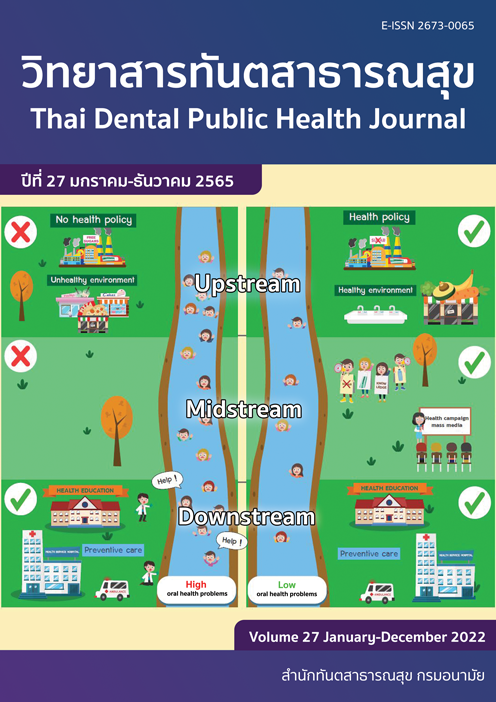Effectiveness of learning process model to improve oral health literacy among parents of early childhood in Health Promotion Center Region 1, Chiang Mai
Main Article Content
Abstract
This quasi-experimental study aimed to test the effectiveness of a learning process to improve oral health literacy among parents of early childhood. The samples were 60 parents who brought their early childhood aged 1-5 years to Health Promoting Hospital, Health Promotion Center Region 1, Chiang Mai. The samples were drawn to be classified as an experimental group and a control group, each group consisting of 30 parents. The experimental group attended 6 activities of the learning process in 5 weeks while the control group received the routine activity. The oral health literacy of parents of children 2–5-year-old test was used for the pre-test and post-test. Data were analyzed using paired t-test, and independent t-test at a 5% significant level. The result showed that the mean overall oral health literacy scores of parents in the experimental group after attending learning process activities were significantly different from those of the control group (p=0.016).
Downloads
Article Details

This work is licensed under a Creative Commons Attribution-NonCommercial-NoDerivatives 4.0 International License.
References
World Health Organization. Health Promotion Glossary. Geneva: WHO; 1998.
Baker D, Gazmararian J, Williams M, Scott T, Parker R, Green D. Functional health literacy and the risk of hospital admission among medicare managed care enrollees. Am J Public Health 2002; 92(8): 1278-83.
DeWalt DA, Berkman ND, Sheridan S, Lohr KN, Pignone MP. Literacy and health outcomes: a systematic review of the literature. J Gen Intern Med 2004; 19(12): 1228-39.
Nutbeam D, Kickbusch I. Advancing health literacy: a global challenge for the 21st century. Health Promot Int 2000; 15(3): 183-4.
National Institute of Dental and Craniofacial Research, National Institute of Health, U.S. Public Health Service, Department of Health and Human Services. The invisible barrier: literacy and its relationship with oral health. J Public Health Dent 2005; 65 (3): 174-82.
Horowitz AM, Kleinman DV. Oral Health Literacy: The new imperative to better oral health. Dent Clin North Am 2008; 52(2): 333-44.
Ismail AF, Ardini YD, Mohamad N, Bakar HA. Association between parental oral health literacy and children’s oral health status. Rev Latinoam Hipertens 2018; 13(3): 305-9.
Vann WF Jr, Lee JY, Baker D, Divaris K. Oral health literacy among female caregivers: Impact on oral health outcomes in early childhood. J Dent Res 2010; 89(12): 1395–400.
Vann WF Jr, Divaris K, Gizlice Z, Baker AD, Lee JY. Caregivers’ health literacy and their young children’s oral health related expenditures. J Dent Res 2013; 92(7): 55S-62S.
Vichayanrat T, Sittipasoppon T, Rujiraphan T, Meeprasert N, Kaveepansakol P, Atamasirikun Y. Oral health literacy among mothers of pre-school children. M Dent J 2014; 34(3): 243-52.
Sornchom P. Relationship between caregiver oral health literacy and dental caries status of pre-school children in rural area. Thesis. Chiangmai University, Chiangmai; 2019. (in Thai)
Bureau of Dental Health. The 8th national oral health survey 2017 of Thailand. Bangkok: Department of Health; 2017. (in Thai)
Dieng S, Cisse D, Lombrail P, Azogui-Le´vyID S. Mothers’ oral health literacy and children’s oral health status in Pikine, Senegal: A pilot study. PLoS One 2020; 15(1): e0226876.
Thanakwang W. The effective of oral health literacy program in novices, Phrapariyattidhamma School, Tha Wang Pha district Nan province. AJCPH 2021; 7(1): 87-97. (in Thai)
Nurash P, Intarakamhang U, Kasevayuth K. Effect of teaching program on oral health literacy and patient-centered communication promotion. JBSD 2019; 11(1): 71-90. (in Thai)
Xayavong O, Saranrittichai K. The effects of oral health literacy development program to prevent gingivitis among the fifth grade students, Khammouane Province, Lao People's Democratic Republic. Th Dent PH 2021; 26: 37-50. (in Thai).
Sookpool A, Kingmala C, Pangsuk P, Yeanyoun T, Wongmun W. Effectiveness of health literacy and health behavior development program for working people. JHS 2020; 29(3): 419-29. (in Thai)
Nutbeam D. Defining, measuring and improving health literacy. HEP 2015; 42(4): 16-21.
Office of DOH 4.0 and Health Literacy. Department of Health. Concept and principles of health literacy organization. [online] 24 September 2018 [cited 2021 Oct 30]; Available from: https://psdg.anamai.moph.go.th/th/health-literacy-km/download?id=34112&mid=11567&mkey=m_document&lang=th&did=11744
Bureau of Dental Health. Manual mother and early childhood oral health care for mother and child cluster. [online] 3 December 2018 [cited 2021 May 31]; Available from: URL:https://apps.hpc.go.th/dl/web/upFile/2018/12-4245-20181203165234/05a7a19e0853a06f1027b95354433146.pdf
Adam NE. Bloom’s taxonomy of cognitive learning objectives. J Med Libr Assoc 2015; 103(3): 152–3. doi: 10.3163/1536-5050.103.3.010
Knowles MS. The modern practice of adult education: From pedagogy to andragogy. New York: Cambridge, The Adult Education Company.1980. [online] 03 2019 [cited 2022 May 31]; Available from: https://colllearning.info/wp-content/uploads/2019/03/The-Modern-Practice-of-Adult-Education.pdf
Health Education Division, Department of Health Service Support, Ministry of Health. Total learning process to enhance health literacy in adult. [online] 22 May 2020 [cited 2021 May 31]; Available from: URL:http://hed.go.th/linkHed/408.
Kaeodumkoeng K, Chaiyaparn N, Boonkla S. A program development of promoting health literacy on disease prevention and control in public health officers. J of Health Ed 2021; 44(2): 187-201. (in Thai).


